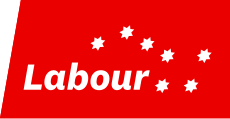
Back حزب العمال (جمهورية أيرلندا) Arabic Partit Laborista (Irlanda) Catalan Plaid Lafur Iwerddon Welsh Irish Labour Party Danish Labour Party (Irland) German Εργατικό Κόμμα (Ιρλανδία) Greek Partido Laborista (Irlanda) Spanish Alderdi Laborista (Irlanda) Basque Työväenpuolue (Irlanti) Finnish Parti travailliste (Irlande) French
Labour Party Páirtí an Lucht Oibre | |
|---|---|
 | |
| Leader | Ivana Bacik |
| Seanad leader | Rebecca Moynihan[1] |
| Parliamentary Party Chairperson | Seán Sherlock |
| Chairperson | Lisa Connell |
| General Secretary | Billie Sparks |
| Founders | |
| Founded | 28 May 1912 |
| Headquarters | 2 Whitefriars, Aungier Street, Dublin |
| Youth wing | Labour Youth |
| Women's wing | Labour Women |
| LGBT wing | Labour LGBT |
| Membership (2020) | ~3,000[2][needs update] |
| Ideology | Social democracy[3] Pro-Europeanism[4] |
| Political position | Centre-left[5] |
| European affiliation | Party of European Socialists |
| International affiliation | |
| European Parliament group | Progressive Alliance of Socialists and Democrats |
| Colours | Red |
| Anthem | "The Red Flag" |
| Dáil Éireann | 7 / 160 |
| Seanad Éireann | 4 / 60 |
| Local government | 55 / 949 |
| Website | |
| labour | |
| Part of a series on |
| Organised labour |
|---|
 |
The Labour Party (Irish: Páirtí an Lucht Oibre, literally "Party of the Working People") is a centre-left[6][7][8] and social-democratic[9][10] political party in the Republic of Ireland.[3] Founded on 28 May 1912 in Clonmel, County Tipperary, by James Connolly, James Larkin, and William O'Brien as the political wing of the Irish Trades Union Congress,[11] it describes itself as a "democratic socialist party" in its constitution.[12]
Labour continues to be the political arm of the Irish trade union and labour movement and seeks to represent workers' interests in the Dáil and on a local level. Unlike many other Irish political parties, Labour did not arise as a faction of the original Sinn Féin party, although it merged with the Democratic Left in 1999, a party that traced its origins back to Sinn Féin. The party has served as a partner in coalition governments on eight occasions since its formation: seven times in coalition either with Fine Gael alone or with Fine Gael and other smaller parties, and once with Fianna Fáil. This gives Labour a cumulative total of twenty-five years served as part of a government, the third-longest total of any party in the Republic of Ireland after Fianna Fáil and Fine Gael.
Led by Ivana Bacik, it is the fifth-largest party in Dáil Éireann, with seven seats, and is the joint third-largest party in Seanad Éireann, with four seats, making Labour the fifth-largest party in the Oireachtas overall as of 2021. The Labour Party is a member of the Progressive Alliance,[13] Socialist International,[14] and Party of European Socialists.[15]
- ^ "Rebeccamoynihan, Author at the Labour Party". Archived from the original on 8 July 2021. Retrieved 13 September 2021.
- ^ Kenny, Aisling (13 April 2020). "Covid-19 to hit parties' votes on government formation". RTÉ. Archived from the original on 16 April 2020. Retrieved 13 April 2020.
- ^ a b Nordsieck, Wolfram (2020). "Ireland". Parties and Elections in Europe. Archived from the original on 7 January 2019. Retrieved 18 October 2021.
- ^ Richard Dunphy (2015). "Ireland". In Donatella M. Viola (ed.). Routledge Handbook of European Elections. Routledge. pp. 247–248. ISBN 978-1-317-50363-7. Archived from the original on 26 December 2018. Retrieved 11 December 2016.
- ^ Richard Dunphy (2015). "Ireland". In Donatella M. Viola (ed.). Routledge Handbook of European Elections. Routledge. pp. 247–248. ISBN 978-1-317-50363-7. Archived from the original on 26 December 2018. Retrieved 11 December 2016.
- ^ Paul Teague; James Donaghey (2004). "The Irish Experiment in Social Partnership". In Harry Charles Katz; Wonduck Lee; Joohee Lee (eds.). The New Structure of Labor Relations: Tripartism and Decentralization. Cornell University Press. p. 17. ISBN 0-8014-4184-6. Archived from the original on 26 December 2018. Retrieved 17 March 2016.
- ^ Brigid Laffan; Jane O'Mahony (2008). Ireland and the European Union. Palgrave Macmillan. p. 142. ISBN 978-1-137-04835-6. Archived from the original on 26 December 2018. Retrieved 17 March 2016.
- ^ Fiona Buckley (16 March 2016). Michelle Ann Miller; Tim Bunnell (eds.). Politics and Gender in Ireland. p. 32. ISBN 978-1134908769. Archived from the original on 19 December 2021. Retrieved 2 October 2020.
- ^ Dimitri Almeida (2012). The Impact of European Integration on Political Parties: Beyond the Permissive Consensus. CRC Press. p. 61. ISBN 978-1-136-34039-0. Archived from the original on 26 December 2018. Retrieved 14 July 2013.
- ^ Richard Collin; Pamela L. Martin (2012). An Introduction to World Politics: Conflict and Consensus on a Small Planet. Rowman & Littlefield. p. 218. ISBN 978-1-4422-1803-1. Archived from the original on 4 October 2020. Retrieved 18 July 2013.
- ^ "Labour's proud history". labour.ie. Archived from the original on 26 October 2020. Retrieved 1 January 2011.
- ^ "Party Constitution". labour.ie. Archived from the original on 10 November 2016. Retrieved 18 March 2016.
- ^ "Participants". Archived from the original on 2 March 2015. Retrieved 25 July 2015.
- ^ "Socialist International – Progressive Politics For A Fairer World". Archived from the original on 14 March 2017. Retrieved 25 July 2015.
- ^ "Parties". Party of European Socialists. Archived from the original on 24 July 2015. Retrieved 25 July 2015.